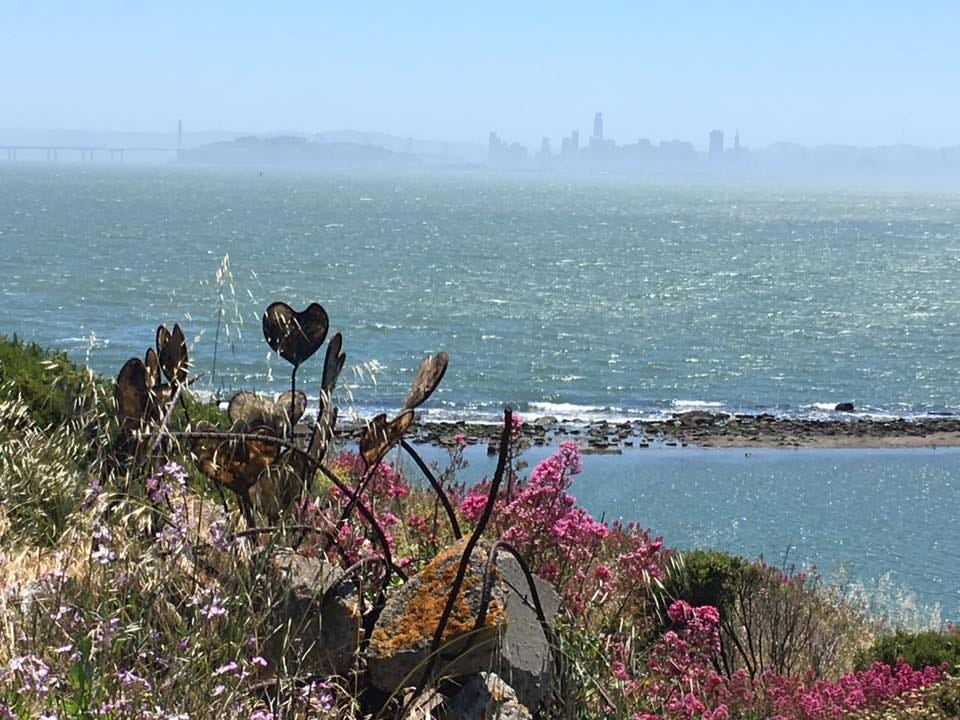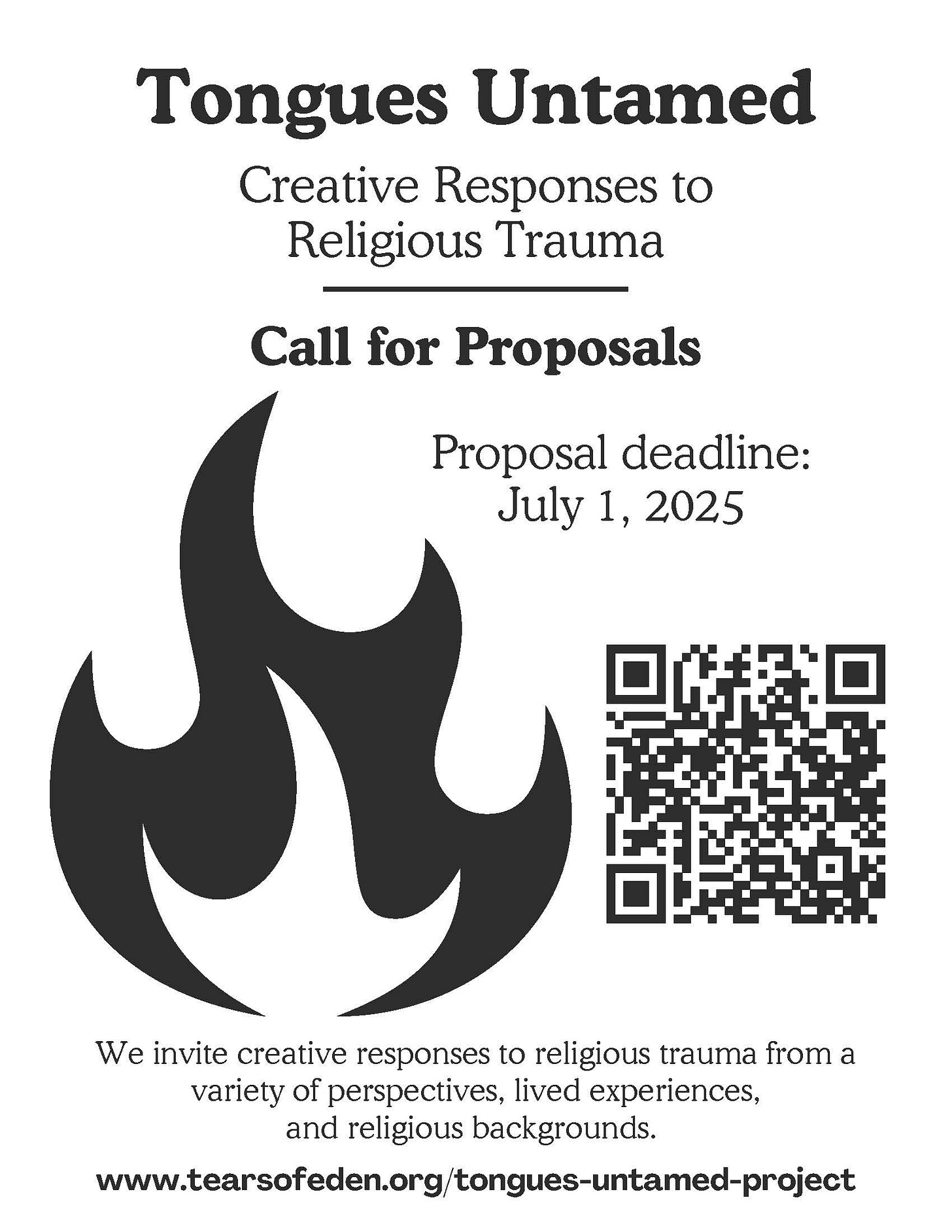A favorite photo of mine taken from the Albany Bulb in Oakland, California. Symbols of love made from discarded rebar. San Francisco rising in the mist. This image more than any other captures for me the hard worn and hard won grace of living a life after purity.
Moving Forward
I am very bad at transitions, especially those that require me to move away from a well-studied set of questions and topics that has manifested the most remarkable community of interlocutors I could have ever imagined. This summer marks the end of my study of evangelical purity culture. I have been amazed at how this sub-field has grown in just the past decade. Watching younger scholars publish and present their work has been one of the greatest joys of my career. While I will always support competent research and the scholars who produce it, I am ready to shift my efforts away from academic work and move toward writing creative non-fiction. I am trying to build a writing practice that focuses on writing for its own sake, not necessarily for publication or public consumption. There are many things I need to write about, but I’m letting myself let go of writing habits that focus on specific publication goals. So far it just feels like I’m flailing in the deep end. And I’m learning to be okay with that.
I’m not sure what this means for the After Purity Substack. Do I keep it? Do I start another? What do I call it? I do very much appreciate have a small following and a few readers—thank you, so I don’t plan on leaving this platform anytime soon.
If you want to follow the most recent scholarship check out the Purity Culture Research Collective. And if you are pursuing your own research, please consider getting in touch. I’ve had the great pleasure of working with this group for many years and they show no signs of stopping. Find out more about them here.
Getting Through
Sitting with the anxiety of our current political climate is a daily task for me. Recently I’ve been following the growing resistance to ICE in places like Los Angeles and Minneapolis. It is both overwhelming and re-assuring to see people willing to stand up against the illegal practices the federal government is deploying. As I write from my home in a quiet neighborhood in mid-Michigan, a sleeping dog next to me, I do not feel like I am on the front lines of this conflict.
But the swift current of Executive Orders unleashed in the first months of the Trump administration remind me of all the ways that the work I do as a university lecturer is very much as risk. For over a decade I have taught a course called Religion, Race, and Discrimination in the United States. It is a course that fulfills a university requirement that all students must take a course on racial discrimination, one that has existed since the 1990s. In that time I have had a handful of students complain that the course and its professor are biased against Christianity and those who practice it. Granted it is hard to cast Christianity in a good light when the topic is European colonialism or Manifest Destiny or Native American boarding schools. But we also study African American religions, the conversion of enslaved people to Christianity, the formation of Black Protestant Churches, and the Christian roots of the Civil Rights Movement. This history is filled with the promises of Christianity as a life-affirming set of beliefs that pursue justice and offer the promise of liberation. When we can’t recognize that as an affirmation of the Christian tradition, it makes me wonder what those grievances are really about.
One of the first Executive Orders filed by the Trump administration is titled, Eradicating Anti-Christian Bias. The description reads, “It is the policy of the United States, and the purpose of this order, to protect the religious freedoms of Americans and end the anti-Christian weaponization of government. The Founders established a Nation in which people were free to practice their faith without fear of discrimination or retaliation by their government.” While this appears to focus solely on the actions of the federal government, coupled with the administration’s targeting of higher education these orders could be weaponized against any of us who teach any number of subjects related to religion, United States history, racism, homo/trans-phobia, settler colonialism and so on.
This past semester was stressful to say the least. But at the end I’ve never had so many students thank me for my work including one who said, “Do not ever stop teaching this course.” For many months I had been thinking of doing just that, but this student spoke a truth I was grappling with. This history, this critical engagement is necessary now more than ever. And while students will still claim anti-Christian bias (as one did in the course survey this semester) I no longer have to do the hard work to convince anyone at my university that my work is valuable. For now the work is to rest and restore in order to prepare for a fall semester that is already being shaped by so much uncertainly.
Elizabeth Gish at Lotus and Phoenix Substack and the Kettering Foundation has offered a couple of resources that have been grounding me this week. If you are like me, approaching “What To Do?” lists means feeling overwhelmed by all the ways I am failing my community and the common good. A practice I’ve recently adopted is called “Take One Thing.” Find one thing that fits into your life, that helps you feel rejuvenated, and hopeful. The hope of Getting Through is learning to thrive even as so much trying to deplete us. We cannot do all the things, we as individuals are not meant to do all the things. We are meant to build community and seek other practices that sustain us and see us through hard times while keeping our humanity intact.
New Work
Speaking of work that builds community: I am delighted to be part of a new collaborative project on religious trauma. Tongues Untamed is currently seeking submissions from creative writers who write about religious trauma. Our team is excited to read your work and consider it for publication. Use the QR code on the flier to learn more and submit your writing for consideration.





Thanks for the valuable resources and for the needed reminders! “Rest and restore” and we’ll keep doing this good work together! I’m excited to see where your exploratory writing takes you next!
Sara, I’m so grateful for your work and continuing presence, though it may not be academic. I look forward to your creative nonfiction endeavors!